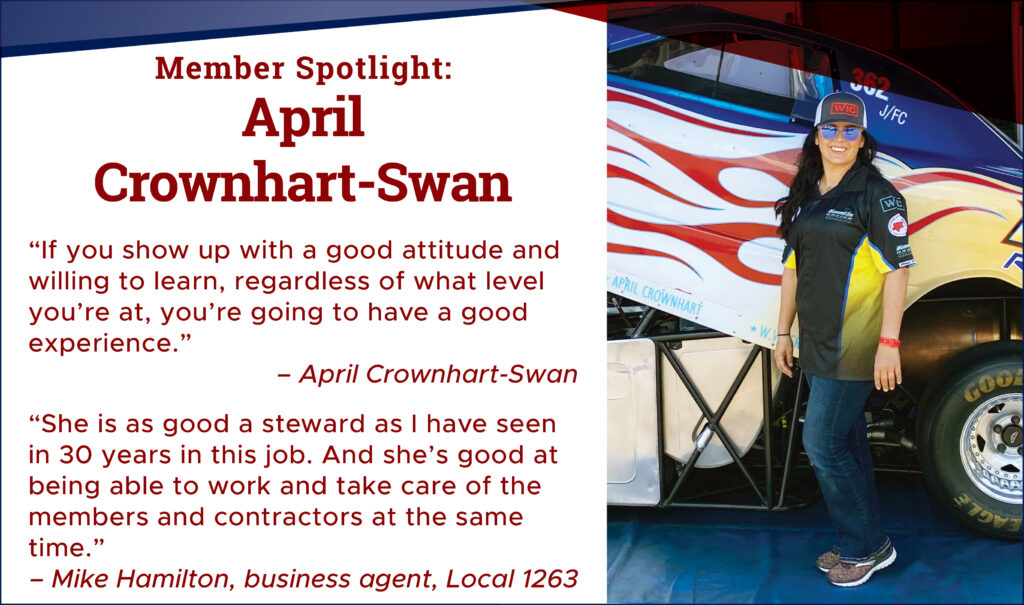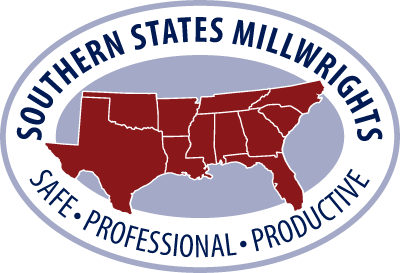A military veteran and race-car driver, April Crownhart-Swan loves her job and strives for balance in all areas of her life.

When April Crownhart-Swan was 7 years old, she told her mother she was going to be a race-car driver and a union member. She has accomplished both goals. Crownhart-Swan is a member of Millwright Local 1263 in Georgia and has been a union millwright for 15 years. She says her job’s pay and flexible work schedule has helped her pursue her other goal of owning and driving a jet funny car.
Mike Hamilton, business agent for Local 1263, says Crownhart-Swan has been a steward on major projects with more than 700 members. “She is as good a steward as I have seen in 30 years in this job,” Hamilton said. “She’s extremely conscientious of everything she does. And she’s good at being able to work and take care of the members and contractors at the same time. She’s extremely balanced. We’ve never called on her for anything she hasn’t come through and done for us.”
Read more about Crownhart-Swan in the interview below.
Q: How did you learn about the millwright career?
A: So I actually was supposed to be an ironworker. My dad was an ironworker for 42 years. I found out I could get military points to boost me up because up North it’s really hard to get in the union. It’s super selective. So I joined the military and participated in Operation Iraqi Freedom. When I got out, I joined Helmets to Hardhats, a program that helps former military members transition to civilian jobs. The business agent for a carpenter and millwright local in Georgia found me through that program. I called my dad and said, ‘Dad, what the hell is a millwright?’ And he told me, ‘Honey, if they want you, they will keep you working. That’s where you need to go.’
Q: Where did you grow up?
A: I grew up in Illinois. I knew what the union was about because of my dad. I was raised in union culture. Every year, they had a Labor Day picnic. All of the trades would get together, especially the ironworkers from my dad’s Local 498. They’d have T-shirts, my dad would take his race car, and we would all be in the Labor Day parade.
Q: Tell us a little more about your military experience.
A: I went in in 2001, and I went in as a welder because I had been welding since I was 15, and I knew that was what I wanted to do so I could get the military points. I got to my duty station in October, and I was deployed in January. I was part of the operation to invade Iraq and get rid of Saddam Hussein.
Q: How long were you there and what was your job?
A: I was on the service and recovery side, so we had to go in and help tow out vehicles and repair them. We did a lot of welding on tanks and different types of equipment. I was in Iraq for about eight months, and then stationed at Fort Benning in Georgia for another two years after that.
Q: Why did you want to join a union?
A: I told my mom when I was 7 years old, ‘I’m going to be in a union.’ When I was little, we didn’t want for anything. We always went on vacation. We had great health insurance. I saw that my dad made great money. My parents didn’t struggle. My dad would work hard during the week and then would take off on the weekends and go racing. That was our family fun. Why would I not want to be in something that gave me great retirement, great health insurance, and a great paycheck?
Q: Did you join the local in Georgia?
A: Yes, it was Local 144, and it has been merged with other locals. I’m part of Millwright Local 1263 now.
Q: Did you start as an apprentice?
A: I tested and came in at the beginning of my third year, so I did two years of apprenticeship.
Q: What kinds of millwright work have you done?
A: I’ve done everything but compressors and food processing. There are nine things that are considered part of the millwright trade, and I’ve done seven of the nine.
Q: Is there a type of work that you like best?
A: Conveyor is my favorite. But all of it’s fun. It’s such a small world that you get to know people, and it’s all about your attitude and what you bring to the table. People are willing to teach you things, and you should learn every day. If you show up with a good attitude and willing to learn, regardless of what level you’re at, you’re going to have a good experience. You’ll learn something, and that’s what brings everybody together.
Q: Do you attribute that atmosphere to the union or something else?
A: I would definitely say a lot of it is because it’s union because we’re considered a brotherhood, and you try to treat people how you want to be treated.
Q: What geographic area have you worked in?
A: I’ve worked mainly in the South, the East, a little in the Midwest, and then the West.
Q: What city do you live in and do you mainly travel or stay close to home?
A: I live in Columbus, Georgia, and I usually stay within two hours of the house. I’ve mainly been working for Western Industrial Contractors for the past five years. I’m actually working for them in California right now. Our superintendent asked me to come out here and help them; otherwise I would still be at home. They’re teaching me a lot. And since I love to learn, and they’re willing to teach me, why not go with them?
Q: Tell us about this current job you’re on.
A: We’re building the first all-bolt-up system for FedEx, and Western Industrial Contractors is the first union company to be an integrator for a project on this scale. Being an integrator means Western provides a turnkey system. They do everything from the engineering to the programming. So there is nobody above them other than the customer.
Q: And what is an all-bolt-up system?
A: Usually conveyor systems have a lot of welding in them, so they’re considered weld-up systems. This one is bolted together, so they call it an all-bolted-up system.
Q: Could you tell us about your family?
A: Good home support is so important, and I want to give my husband, Ben Swan, credit. You have to have a good, stable home front to be able to handle a family member being gone six days out of the week and coming home and kind of being a part-time family member.
My son, Maverick Crownhart-Swan is a third-generation union member. He’s 21 and starting his third year as a member of Local 1263. My daughter, Delaney Swan, is 12.
The thing about being in the union is I work and make good money, but then I also have the flexibility to look ahead and take off time. For instance, I just went to Orlando for my daughter’s cheer competition at The Summit, which is like the Super Bowl of cheerleading. Or I take off to go drag racing because the money I make in the union is what supports our racing passion.
The union is definitely a family culture, meaning that if a spouse or a child needs guidance or help or has a question, between leadership and membership, they will help to find you the right answer. I would say the union is really a lot like being in the military.
Q: What are your hobbies?
A: Family time is number one. Balancing self-care, family, and work is an important thing that I really strive to do. If you’re not taking care of yourself physically and mentally, you can’t be there for your family or for your jobsite. I try to eat clean and work out so that I can not only be my best self for me and for my family, but also for the contractor that I’m working for because a lot of the work is physical.
When I was 7 and told my mom I was going to be in a union, I also told her I was going to be a jet funny car driver. About 12 years ago, my dad started teaching me how to drive the car. It has a turbine engine that has flames coming out the back of it, and the races are drag races. I was around it a lot when I was little, but now it’s one of the things we do to get away. It is a lot of work, but it gives you that break from work. You turn everything off and you go to the racetrack. My husband is my crew chief, and he makes sure everything is up and running and good to go. We go to at least five races a year.
Q: What leadership training have you done and what leadership roles have you held with the union?
A: I’ve gone to foreman training and steward training. I’ve done the journeyman leadership classes at the International Training Center. I’ve been a steward on almost all the jobs I’ve been on for the majority of the last five years. I’ve been a foreman on and off the last five years. I’m a Southern States Millwright Regional Council delegate to the international organization – the United Brotherhood of Carpenters.
Q: What are your goals for your career?
A: Definitely to leave a positive footprint. Your footprint of things that you helped build will be there for generations – turbines that put power into homes, automobile plants. My dad built bridges as an ironworker. I’ve done a lot of work at the Atlanta airport. I also want to keep a good paycheck and good health insurance for my family. When I retire, I want to live comfortably, and the union will help me do that. I would like to be able to grow more and help more members see the potential that they have and help a younger generation understand what millwrighting is and what the union is and how it can help them financially and give them a sense of pride in their work. The key thing that my dad taught me in the union culture is: you’re getting paid for a standard, you’re getting paid for quality, you’re getting paid for safety.
